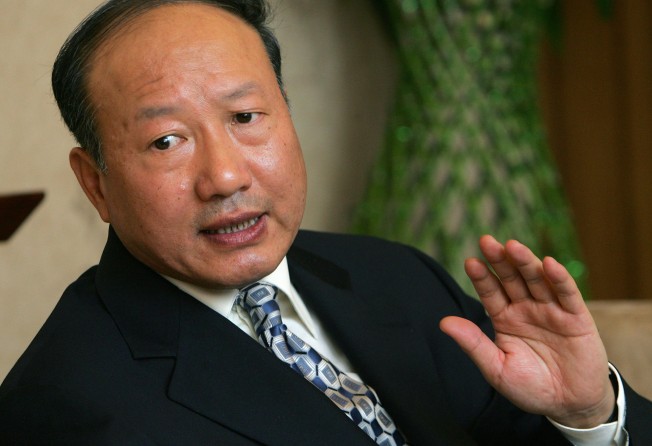Buddhist tycoon Chen Feng built Hainan Airlines into global empire
HNA Group founder says his goal is to become one of the world's top 100 companies by 2020

Twenty years ago, Chen Feng used to push the refreshment trolley up and down the aisle of the lone Boeing 737 that comprised his startup airline.
Today, based on the tropical island of Hainan, he controls a fleet of 483 planes - and has a jet of his own, a Gulfstream G550. Even so, Chen, a devout Buddhist, says he is far from the stereotypical Chinese tycoon.
"I live a simple life," he says.
As he sips a caffe latte in the lounge of the chalet-like Sheraton Davos Waldhuus Hotel in Davos, Switzerland, his words jar with the setting: At January's World Economic Forum, he is surrounded by other corporate titans.
"I don't drink, smoke, have banquets, go to karaoke or get massages," he says. "I'm different from the other entrepreneurs in China."
Where Chen, 60, is more like them is in his vaulting global ambition. In 1995, Chen flew to New York and persuaded George Soros to invest US$25 million in his fledgling Hainan Airlines. Since then, backed by the Soros imprimatur, he has ridden the boom that transformed balmy, coconut palm-fringed Hainan from a backwater into a billionaires' playground reminiscent of a Chinese Hawaii or Riviera.
From his Buddha-shaped, 31-story headquarters in Hainan's increasingly high-rise capital, Haikou, Chen now chairs HNA Group, a closely held global transport, logistics, retail, property, tourism and financial services empire that reported revenue of US$17.5 billion and pre-tax profits of US$837 million for 2012.
Among its US$58 billion worth of assets: a New York office tower, a Spanish hotel group, a French airline and controlling stakes in 10 companies listed on the mainland and Hong Kong exchanges.
"Chen's smart, brave and a gambler," says Albert Louie, founder of Hong Kong-based consulting firm A. Louie Associates, who advises foreign investors in China. "He's also politically well connected, and unlike China's internet entrepreneurs, he isn't in industries that the government might consider threatening to Communist Party control."
Chen has spent more than US$3 billion on foreign acquisitions in the past six years alone. His biggest bet was the US$1.05 billion purchase in 2011 of GE Seaco, the world's fifth-biggest container-leasing company, from General Electric. Such deals would make HNA Group, if publicly traded, one of the world's top 250 companies by assets, according to data.
The founder, though, has much loftier goals.
"By 2020, we can become one of the top 100 companies, and by 2030, we want to be one of the top 50," Chen says. "Assets are still cheap in the US and Europe, and we will continue to acquire them. We need a batch of world-class companies to emerge from China to help the country's growth."
That's a familiar refrain among China's entrepreneurs.
Since the global financial crisis ravaged the rest of the world in 2008, Chinese companies have made about US$360 billion worth of foreign acquisitions.
Chen shouldn't be short of cash for his next deal. At the end of 2012, HNA had US$60 billion in credit lines from Chinese banks, according to its latest financial statements.
Chen says he plans to raise additional capital by selling shares in several HNA units that are unlisted.
In coming months, Chen says, he will announce the initial public offering of Hong Kong Airlines, the city's second-biggest carrier. He acquired the airline in 2006. The listing may raise about US$1 billion later this year, according to a person with knowledge of the plan.
For now, the jewel in HNA's crown remains Shanghai-listed Hainan Airlines, Chen's biggest public company, with a market value of US$3.6 billion. Together with five smaller affiliate airlines, it has a 15 per cent share in the China market, according to Sydney-based Capa Centre for Aviation.
Only the big three state-owned carriers - Air China, China Southern Airlines and China Eastern Airlines - have larger shares.
"Hainan is leaner and more internationally minded than the big three," said Will Horton, a Hong Kong-based Capa analyst. "It can become a serious player to North America."
The airline's key selling points include a crash-free record; doting, glamorously garbed flight attendants; and flat-bed business-class seats that made it the first Chinese airline to win five stars from London-based rating agency Skytrax.
Many of Chen's shareholders have had a less enjoyable ride. Since 2009, the Shanghai Stock Exchange Composite Index has been the eighth-worst performer out of 93 tracked by Bloomberg. And in the 12 months ended Thursday, Hainan Airlines' shares have declined 17 per cent compared with the index's 4 per cent tumble.
Even as he launches more public companies, Chen continues to control his empire through an unlisted holding company that isn't required to disclose its complete balance sheet or the identities of its main shareholders.
One key item HNA does not release is its net profit. Chen says that last year he and six other directors, who between them owned almost all of the stock, donated 20 per cent of HNA's shares, worth US$1.4 billion, to what he describes as a private- equity fund for charity.
The fund is HNA's largest shareholder and Chen says he ranks as the joint second-biggest shareholder, although he declines to reveal the size of his personal holding, making it impossible to determine how rich he is. Given Chen's calculation of the value of the donation, HNA is worth US$7 billion.
"Chen Feng is my idol, but I don't understand his company's structure," said Wang Dafu, 48, a property developer who serves as Chen's deputy chairman at the Hainan Federation of Industry and Commerce.
Although Chen is under no obligation to disclose more than he has about the workings of his private company, investors in Hong Kong Airlines' IPO should expect HNA's ownership to be more transparent, said Ronald Wan, fund manager at Asian Capital Holdings.